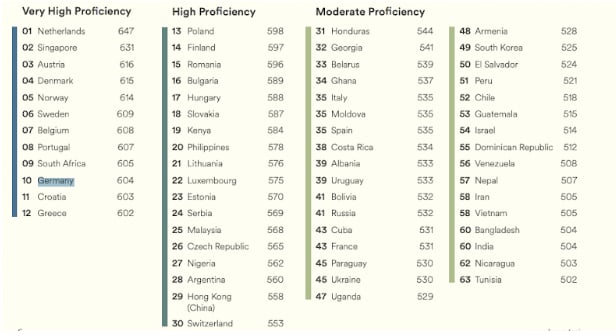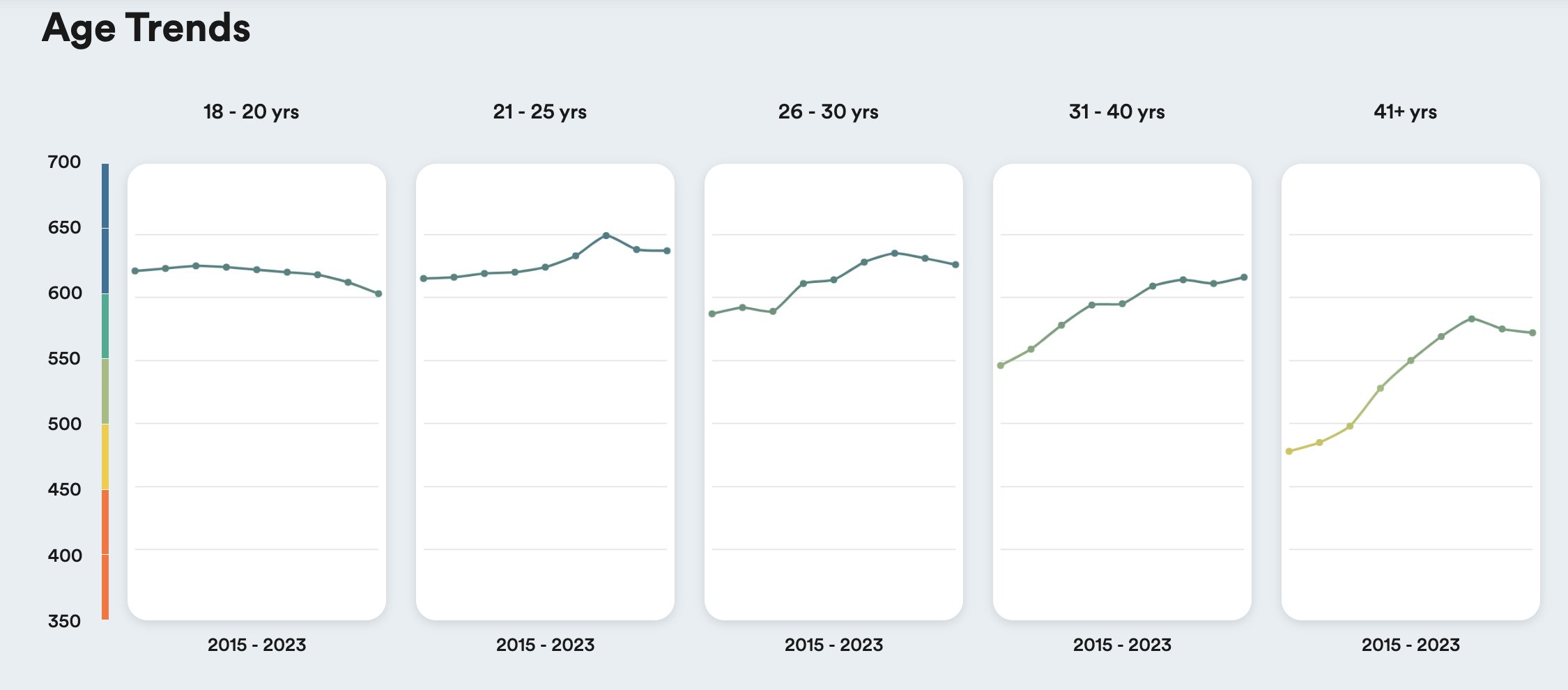How well do Germans speak English compared to the rest of Europe?

Germany once again ranks among the world's best for English proficiency, but it is struggling with a widening gender gap and worsening levels of English among young people.
Every year, the international learning company Education First (EF) publishes its English Proficiency Index (EPI), which ranks mastery of the English language worldwide.
Among 113 non-native countries surveyed, Germany was ranked tenth this year, retaining its previous position.
Within Europe, the country has moved up one place to seventh, overtaking Finland. This is despite the fact that Germany's overall score dropped from 613 last year to 604 this year. However, other top performers have seen similar results. "Europe is in a bit of a slump this year," the report says.
Still, Germany narrowly held on to its ranking as a "very high" average performer - although the regional and gender gaps are widening.
Two of Germany's neighbours were however ranked in the top three worldwide.
The Netherlands again topped this year's list as the world's best for English proficiency, followed by Singapore and Austria. The Scandinavian countries of Norway, Denmark, and Sweden filled the next three positions in the top 6.
At the other end of the index the Democratic Republic of Congo came in last place, with Tajikistan and Yemen just ahead.

Screenshot: Education First
What stands out about Germany's position is that it is the only one of the largest EU members to have a "very high" level of English proficiency, which is equivalent to a B2 level. Italy and Spain both ranked 35th in the world, while France ranked 43rd – the lowest in the Union.
The demographic gap is widening
A major concern of EF's annual study is the decline in English proficiency among young people in some regions. While it expects a post-Covid rebound in young people's English skills in most places, it sees a greater challenge for “countries experiencing a longer decline among the youngest cohort”.
Germany's 18- to 20-year-olds fall into this category. Their proficiency peaked in 2017 and has been declining steadily ever since. This is important to note because most other age groups in Germany peaked in 2021, but now remain at similarly high levels.

Screenshot: Education First
In addition, the German gender gap in language proficiency is widening. The difference in performance between men and women has increased year-on-year, with men stabilising at a "very high" level of 615 points, while women drop into the "high" category for the first time since 2016 (594 points).
In this regard, the study notes that, despite being the obvious culprit, this disparity may not be due to women's lack of access to the workplace. Instead, the problem may run deeper.
“The gender gap among those aged 18-25 is three times as wide as among working adults,” the EPI report notes. This would point to a “problem engendered by educational systems themselves or a societal problem schools are failing to address”.
Comments
See Also
Every year, the international learning company Education First (EF) publishes its English Proficiency Index (EPI), which ranks mastery of the English language worldwide.
Among 113 non-native countries surveyed, Germany was ranked tenth this year, retaining its previous position.
Within Europe, the country has moved up one place to seventh, overtaking Finland. This is despite the fact that Germany's overall score dropped from 613 last year to 604 this year. However, other top performers have seen similar results. "Europe is in a bit of a slump this year," the report says.
Still, Germany narrowly held on to its ranking as a "very high" average performer - although the regional and gender gaps are widening.
Two of Germany's neighbours were however ranked in the top three worldwide.
The Netherlands again topped this year's list as the world's best for English proficiency, followed by Singapore and Austria. The Scandinavian countries of Norway, Denmark, and Sweden filled the next three positions in the top 6.
At the other end of the index the Democratic Republic of Congo came in last place, with Tajikistan and Yemen just ahead.

What stands out about Germany's position is that it is the only one of the largest EU members to have a "very high" level of English proficiency, which is equivalent to a B2 level. Italy and Spain both ranked 35th in the world, while France ranked 43rd – the lowest in the Union.
The demographic gap is widening
A major concern of EF's annual study is the decline in English proficiency among young people in some regions. While it expects a post-Covid rebound in young people's English skills in most places, it sees a greater challenge for “countries experiencing a longer decline among the youngest cohort”.
Germany's 18- to 20-year-olds fall into this category. Their proficiency peaked in 2017 and has been declining steadily ever since. This is important to note because most other age groups in Germany peaked in 2021, but now remain at similarly high levels.

In addition, the German gender gap in language proficiency is widening. The difference in performance between men and women has increased year-on-year, with men stabilising at a "very high" level of 615 points, while women drop into the "high" category for the first time since 2016 (594 points).
In this regard, the study notes that, despite being the obvious culprit, this disparity may not be due to women's lack of access to the workplace. Instead, the problem may run deeper.
“The gender gap among those aged 18-25 is three times as wide as among working adults,” the EPI report notes. This would point to a “problem engendered by educational systems themselves or a societal problem schools are failing to address”.
Join the conversation in our comments section below. Share your own views and experience and if you have a question or suggestion for our journalists then email us at [email protected].
Please keep comments civil, constructive and on topic – and make sure to read our terms of use before getting involved.
Please log in here to leave a comment.